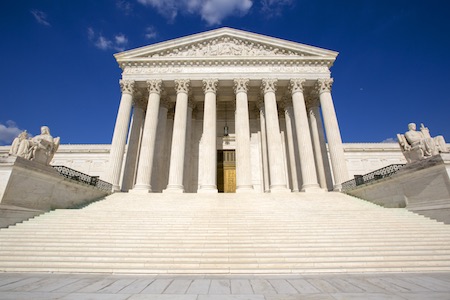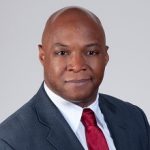 Earlier today the United States Supreme Court issued its much-anticipated decision in TC Heartland LLC v. Kraft Food Group Brands LLC. In a unanimous decision of the Court delivered by Justice Thomas (minus Justice Gorsuch who did not participate in consideration of the case) the Supreme Court reversed the Federal Circuit and ruled that 28 U.S.C. 1400(b) remains the only applicable patent venue statute. For the most part, this decision will require patent owners to sue those infringing their patents in a district court in the state where the infringer is incorporated. For my take see: SCOTUS reverses Federal Circuit in TC Heartland.
Earlier today the United States Supreme Court issued its much-anticipated decision in TC Heartland LLC v. Kraft Food Group Brands LLC. In a unanimous decision of the Court delivered by Justice Thomas (minus Justice Gorsuch who did not participate in consideration of the case) the Supreme Court reversed the Federal Circuit and ruled that 28 U.S.C. 1400(b) remains the only applicable patent venue statute. For the most part, this decision will require patent owners to sue those infringing their patents in a district court in the state where the infringer is incorporated. For my take see: SCOTUS reverses Federal Circuit in TC Heartland.
What follows is reaction from a distinguished panel of industry insiders who have been following this case. Each have offered their own instant analysis, several pointing out that important questions remain about what this Supreme Court decision will mean for the many thousands of patent cases already filed, many that are now in inappropriate venues. It is probably fair to say that the ruling did not surprise most of our panel (although one person did express surprise), but several on our panel did point to the Supreme Court’s decision as more in a decade-plus line of cases that have continually eroded the rights of patent owners.
 Todd Dickinson
Todd Dickinson
Former Director of the USPTO
Senior Partner, Polsinelli
In its TC Heartland v. Kraft opinion today, the Supreme Court very predictably, and unanimously, reversed the CAFC’s 25 year old precedent on patent litigation venue, reverting to limiting venue to where the Defendant was incorporated, in addition to where the infringement occurred and had a regular place of business. (Foreign corporations still presumably can be sued most anywhere.) With nary a reference to “fixing the problem” with the Eastern District of Texas, (which many amici had gone into in gory detail), nor yet again chastising the patent assertion entity business model, Justice Thomas framed his opinion as a matter of simple statutory construction, with a soupcon of trendy ‘originalism’ tossed in for good measure.
That said, the impact on both the EDTx and PAE’s is likely to be significant. Assuming that they still want to file, the PAE’s will now have more limited options. However, as pointed out in a recent paper, Santa Clara Law Professor Colleen Chien calculated the impact on the various courts, and found significant, though not complete, changes. ln other words, the EDTx is probably not out of business just yet. Secondly, Justice Thomas gave no hint as to how to manage the near term procedural aspects, especially for pending cases. Just filed in EDTx? Move to transfer might be pretty straightforward. Pending for several years of discovery and motion practice, finally ready to go to trial? Not so much. So wait and see there, but at least a little extra lawyering to keep the cash flow up.
However, and perhaps more interesting for the policy/political geeks, is the impact on patent litigation reform legislation, pending the last several Congresses. Sen. Flake’s standalone venue bill was riddled with exceptions and detail, presumably to account for every possible stakeholder demand. With its limiting of “place of business” to bricks and mortar facilities, while at the same time carving out exceptions for all sorts of lobbyists, it may likely give way to more pressing concerns, as did various aspects of reform after eBay, Halo, and Therasense. And while House Judiciary Committee Goodlatte also announced today that, in light of this decision, he’s moving on to “on other aspects of abusive patent litigation”, it’s a little difficult to see how this now-narrow set of issues really stirs anyone other than some in Big Tech to action.
 Bob Stoll
Bob Stoll
Former Commissioner for Patents, USPTO
Partner, Drinker Biddle
The TC Heartland decision finds venue proper where the defendant: (1) resides which now means where defendant is incorporated and, (2) where the defendant has committed acts of infringement and has a regular established place of business. It will be interesting to see how this plays out and what choices the plaintiffs will make. Does this mean that the plaintiffs could go after the stores in Texas that sell the alleged infringing products? Also will the intellectual property community now seek legislation to again reset the needle or will we wait to see how this all works? And what does this mean for foreign companies? We shall see.
 Stephen Kunin
Stephen Kunin
Former Deputy Commissioner for Patents, USPTO
Managing Partner, Oblon, McClelland, Maier & Neustadt
Today, the Supreme Court in a 8-0 decision, in which Justice Gorsuch did not participate, issued an unremarkable and highly predictable opinion in TC Heartland LLC v. Kraft Foods Group Brands, LLC. Justice Thomas writing for the Court held, that consistent with Fourco Glass Co. v. Transmirra Products Corp., 353 U.S. 222, 226, for venue purposes of 28 U.S.C. § 1400(b) a domestic corporation “resides” only in its State of incorporation. The amendments to 28 U.S.C. § 1391 did not modify the meaning of § 1400(b). The opinion of the Court unsurprisingly takes a strict statutory constructionist stance and consistent with its pattern of granting certiorari in patent cases reversed the Federal Circuit’s interpretation of a patent venue statute. Notably, this is another instance where the Supreme Court unanimously shows animus against special treatment by patent laws of subject matter that is generally applicable to all types of law.
While this decision is not favorable to patent owners, patent venue as interpreted by the Federal Circuit in VE Holding Corp. v. Johnson Gas Appliance Co., 917 F.2d 1574, 1578 has been the target of patent reform debates in Congress for many years. Had the Supreme Court not reversed the Federal Circuit Congressional leaders may have pursued legislation in 2017 to accomplish the same outcome as in today’s decision in TC Heartland.
 William A. Munck
William A. Munck
Managing Partner, Munck Wilson Mandala, LLP
The Supreme Court took the title of “Patent Litigation Hotbed” away from the Eastern District of Texas and awarded it to the District of Delaware. In finding that the two prior amendments to §1391 did not modify the Fourco meaning of §1400(b), the Court ruled that a patent infringement claim must be brought in a judicial district in the State where a defendant (i) is incorporated or (ii) committed acts of infringement and has a regular and established place of business.
Patent litigation became a lot cheaper today for the defendant. The Eastern District’s local rules are as rigid as they are quick, requiring patent infringement defendants to invest significant resources in the frontend of a lawsuit (e.g., substantial development of defenses/contentions prior to case management conference). The Delaware District, while known for patent savviness, does not require such upfront investment, and is certainly not considered pro-plaintiff as many consider the Eastern District to be. Today’s decision will lead to patent infringement suits being filed in States where the defendant (i) committed acts of infringement and (ii) has a regular and established place of business.
 Dana Rao
Dana Rao
Vice President of Intellectual Property and Litigation, Adobe
Adobe commends the Supreme Court for its unanimous decision to limit forum shopping in the TC Heartland v. Kraft Foods Group ruling. This is a critical step towards ending predatory patent litigation. Like many tech companies, Adobe deals with frivolous patent suits in places like the Eastern District of Texas because plaintiffs search for friendly courts. There’s no place in the judicial system for the type of blatant forum shopping that is occurring in patent litigation today. Our country needs a patent system built for the 21st century innovator, and the first step to achieving that is ensuring forum shopping becomes a thing of the past. Adobe is a strong believer in the patent system, where high quality patents are used to defend innovation. Ending abusive litigation tactics and continuing to focus on issuing high quality patents will help the country refocus the patent system back to its original principles.
 Paul Morinville
Paul Morinville
Managing Director, US Inventor
Most patent suits must now be filed in the district where the defendant is incorporated. For the most significant inventions, those with the greatest commercial success that have created or significantly improved entire industries, particularly those in technology, the cost, complexity and risk of defending patent rights will be increased to prohibitive levels. From a practical perspective, this means that many of the most valuable new technologies will very likely be unenforceable in the United States. These are the technologies that construct our infrastructure and defense and create most of our new jobs. These technologies are enforceable in China, so venture capital and the startups that develop them these technologies will continue to move to China and in a short time, this will become a national security disaster as we are forced to buy technologies that support our infrastructure and military from China.
This ruling continues a decade long pattern of Supreme Court activism and Congressional misdirection that is devastating to small entities because it increases cost and complexity and creates enormous uncertainty. The current environment of patent law for small entities is already bleak. Injunctive relief is impossibly hard to prove, obviousness is no longer defined, what is patentable subject matter is not defined, damages are in free fall, patents are invalidated at incredibly high rates, and administrative tribunals within the USPTO are invalidating an overwhelming percentages of issued patents, a property right. Contingent fee attorneys and investors have largely already fled the patent business. This ruling will cause whatever few are remaining to go wherever they went.
We are embarked on a course of economic and technological self-destruction as the rest of the world goes the other direction.
 Harper Batts
Harper Batts
Partner, Baker Botts
The Supreme Court’s decision in TC Heartland will now shift the analysis for venue in patent cases to where a domestic corporation “has committed acts of infringement and has a regular and established place of business” or its state of incorporation. There is a limited body of caselaw that exists on this subject that will now be the basic framework for venue battles. However, that caselaw is from the 1980’s, so it isn’t clear how courts will treat modern day situations, including for example Internet-based websites. But the caselaw does make clear that the test is not limited to whether a company has a fixed physical presence such as an office or store in the district, but instead “whether the corporate defendant does its business in that district through a permanent and continuous presence.” In re Cordis Corp., 769 F.2d 733, 737 (Fed. Cir. 1985).
In addition, this decision may provide an incentive for patent owners to target customers, distributors, or their own suppliers who satisfy the venue requirements rather than suing the primary target directly. What is also notable in the Supreme Court’s decision is what it did not address. Another issue to consider is that footnotes 1 and 2 make clear that this decision applies only to domestic corporations, not to foreign companies or other types of domestic entities.

 Kristen Cramer (left) & Dana Severance (right)
Kristen Cramer (left) & Dana Severance (right)
Partners, Womble Carlyle Sandridge & Rice, LLP
Given that more U.S. corporations are incorporated in Delaware than in any other state, the first test means that many new cases which, prior to the Supreme Court’s decision, may have been filed in the Eastern District of Texas (and elsewhere around the country), now will be heading to the First State. Fortunately, the District of Delaware is well-equipped to meet the challenge.
Delaware has been the second-busiest patent district in the country, behind the Eastern District of Texas, for years. The district has seen its share of complex, multi-party patent cases in a range of industries. The judges in Delaware are well-versed in patent law, and patent cases proceed in an organized, timely manner. Litigators can expect a courteous, but no-nonsense and formal, approach from the court. Further, Delaware has the legal infrastructure to accommodate high-level patent litigation.
 Matthew Holohan
Matthew Holohan
Partner, Kilpatrick Townsend
The Court’s ruling will likely lead to a significant reduction in the number of cases filed in the Eastern District of Texas as plaintiffs must now look for venues where defendants are either incorporated or have a regular and established place of business. Many U.S. companies are incorporated in Delaware, so we should see an increase in cases filed in that district, which is already a somewhat popular venue for patent cases. Large technical centers like Northern California will also see an uptick, and in general there will be more regional diversity in patent filings. This may even encourage more courts to adopt patent local rules to more easily litigate patent cases. Further, the Court left unanswered the question of how its ruling impacts foreign corporations, so the Eastern District of Texas will likely remain a popular venue for suits against foreign defendants. This could tee up another venue fight over foreign corporations in the near future. Courts will also have to consider how to apply the ruling in cases that name multiple defendants incorporated in different states.
 Brian Pomper
Brian Pomper
Executive Director, Innovation Alliance
Partner, Akin Gump
It is important to recognize that the Supreme Court’s decision today follows numerous other Supreme Court rulings over the last decade that have made it more difficult for patent holders to enforce their patents. This decision also comes on top of several major legislative and administrative measures adopted in recent years that have similarly weakened patent rights. Taken together, these patent system changes have made it harder for American inventors to succeed and undercut a key driver of U.S. innovation and job creation.
Disturbingly, the U.S. is no longer considered the gold standard among patent regimes. While the U.S. has been curtailing patent protections, our foreign competitors, such as China and Germany, have been moving to strengthen those protections and promote innovation in their countries. Notably, in 2016, the U.S. fell to 10th place in the U.S. Chamber of Commerce’s international ranking of patent system strength, falling behind countries such as Singapore, Spain and Italy.
As a result, innovation – and the jobs and economic growth that go with it – has increasingly moved overseas, along with the venture capital that funds so much of our start-up and entrepreneurial growth. In 2014, the rate of new U.S. startups was the second lowest on record. In 2015, the U.S. share of global venture capital shrank to 54%, down from 83% in 1996. And according to the National Venture Capital Association, in three of the last four years, at least half of the top ten largest venture investments in the world occurred outside the U.S.
Patents provide a vital incentive for inventors, entrepreneurs, start-ups and universities to innovate and bring new technologies and medical breakthroughs to market. Without strong intellectual property rights, our innovations can be knocked off by large corporations and foreign entities, and small inventors have no recourse when their ideas are stolen. The American patent system has been central to creating an innovation ecosystem that has produced the strongest economy in the world. The U.S. must adopt policies that strengthen our patent system, instead of further weakening it.
 Chris Larus
Chris Larus
Partner, Robins Kaplan
The Supreme Court’s decision in TC Heartland v. Kraft Foods strikes a substantial blow against plaintiffs who seek to bring patent suits in the Eastern District of Texas. The Eastern District of Texas is a forum of choice for many plaintiffs in patent litigation, with 37 percent of all patent cases filed there in 2016. In 2016, a single judge in that district – U.S. District Judge J. Rodney Gilstrap – was assigned more than a thousand new patent cases – amounting to nearly 25 percent of the nation’s total.
Today’s Supreme Court decision substantially restricts patent filings to only those states in which a defendant is incorporated, or maintains a regular and established place of business. The decision was based on the Court’s narrow reading of the patent-specific venue statute, and rejected the longstanding interpretation of the lower Federal Circuit Court of Appeals that allowed patent suits to be brought in any judicial district in which the defendant is subject to personal jurisdiction and sells an allegedly infringing product.
This decision substantially restricts the venue options for patent plaintiffs. Over the past decades, patent litigation has been increasingly concentrated in four of the country’s 94 judicial districts – including the Eastern District of Texas. This decision is likely to reverse that trend. We expect to see many more cases brought in states in which defendant companies are incorporated or have major business operations. This decision will also make it more challenging for patent plaintiffs to bring parallel patent suits against multiple defendants in a single district. As a result of today’s decision, suits against multiple patent infringers may have to be brought in courts throughout the country – potentially increasing the plaintiff’s litigation costs and increasing the risk of inconsistent outcomes.
 Thomas Duston
Thomas Duston
Partner, Marshall, Gerstein & Borun
The Supreme Court stunned the nation’s IP community today by declaring that a nationwide venue for patent cases is now dead. Ruling in TC Heartland LLC v. Kraft Foods Group Brands LLC, the Supreme Court rejected precedent established by the Federal Circuit that has reigned for nearly 30 years. The Supreme Court declared that patent holders may sue only in the state in which an accused infringer is incorporated, or in a district in which they have committed acts of infringement and have an ‘established place of business.’
The consequences of the Supreme Court’s action cannot be understated. Patentee friendly jurisdictions—in particular, the Eastern District of Texas—are destined to see a dramatic decline in patent litigation. In contrast, the Federal District Court for the District of Delaware will undoubtedly see a significant rise in patent litigation, owing to the large number of corporations incorporated in Delaware.
In the immediate aftermath of the Supreme Court’s decision, parties will likely scramble to answer a number of questions. What becomes of pending cases in venues that are improper under the Supreme Court’s decision? Will litigants now be offered an opportunity to assert a defense of improper venue if, in reliance upon previous precedent, they failed to previously raise such a defense? What interpretation will courts now give to the alternative requirement that venue is proper where the defendant has ‘committed acts of infringement’ and has an ‘established place of business’? In the last 30 years, courts have had little occasion to address this second basis for venue.
 Shawn Hansen
Shawn Hansen
Partner, Nixon Peabody
Forum shopping in patent litigation is over. Today the Supreme Court rejected a venue rule that for more than 25 years has permitted patent suits to be filed anywhere an accused infringer is subject to personal jurisdiction. This rule enabled the Eastern District of Texas – a rural region between Dallas and the Louisiana border – to attract something like half of all patent litigation in recent years despite its lack of a meaningful connection with most patent disputes. After today’s ruling, very few patent cases will qualify for venue in East Texas.
Much like all politics are local, litigation procedures and policies are highly localized, which is why venues like East Texas can become popular. Although the Supreme Court’s ruling is mundanely procedural on its face, it will have major impacts on the practicalities of patent litigation going forward. The half of patent cases previously filed in East Texas will now have to shift to places like Delaware, California, and New York. The costs of defending patent litigation will be reduced, and the costs of patent trolling activity will be increased. Together with the reforms of the America Invents Act, todays’ ruling in TC Heartland may be remembered as among the most impactful patent reforms in recent memory.
 Jonathan Waldrop
Jonathan Waldrop
Partner, Kasowitz Benson Torres
The Supreme Court’s TC Heartland decision is the most significant Supreme Court decision in patent law in 20 years, putting a cap on the Court’s reshaping of patent litigation over the last decade. By restricting venue to the place of incorporation for patent cases, the Court has dramatically changed the dockets of the Eastern District of Texas and the District of Delaware overnight. The decision will also lead to significant motion practice across the country as defendants seek to move pending cases. This will cause a fair amount of confusion and inconsistent results as district courts and the Federal Circuit struggle in a game of musical chairs, expected to last several years.

![[IPWatchdog Logo]](https://ipwatchdog.com/wp-content/themes/IPWatchdog%20-%202023/assets/images/temp/logo-small@2x.png)

![[Advertisement]](https://ipwatchdog.com/wp-content/uploads/2024/04/Patent-Litigation-Masters-2024-sidebar-early-bird-ends-Apr-21-last-chance-700x500-1.jpg)

![[Advertisement]](https://ipwatchdog.com/wp-content/uploads/2021/12/WEBINAR-336-x-280-px.png)
![[Advertisement]](https://ipwatchdog.com/wp-content/uploads/2021/12/2021-Patent-Practice-on-Demand-recorded-Feb-2021-336-x-280.jpg)
![[Advertisement]](https://ipwatchdog.com/wp-content/uploads/2021/12/Ad-4-The-Invent-Patent-System™.png)







Join the Discussion
23 comments so far.
thriller
May 31, 2017 05:26 pmWith the way things have been going, I think the NPE litigation enforcement model is severely weakened. But if venue is now tied to the defendant, even in the case of declaratory judgement actions (which is a very big IF), then there might still be a business model for patent holding companies to license/sell patent rights directly to the infringing companies.
In this fashion, if the patent holding company incorporates in a venue that is undesirable to the potential infringers, the patent holder could potentially engage in dialogue directly with said potential infringers, and possibly interest them in acquisition/license. All at a very modest cost, as the risk of a DJ would be greatly reduced.
Tom
May 31, 2017 01:53 pm@ 16 Gary. “[F]rom the perspective of an independent inventor, this is just another in a long line of cases that pushes us to sell to (or partner with) patent assertion entities.”
I am an independent inventor, and I agree 100%. Big business needs to realize that the more difficult they make it for small inventors like me to enforce my IP, the more likely I will cede my IP over to a PAE/troll, simply because I cannot afford the now additional expense to travel to multiple states in order to enforce my IP rights. PAEs have a value proposition (and financial backing) that can enforce my IP rights for me, and that value proposition just increased as a result of Heartland.
I agree with Mike. 1400(b) should also include venue in districts at least where inventors did their research or where they reside.
The text of this bill — https://www.congress.gov/bill/114th-congress/senate-bill/2733 — is excellent.
Under its new construction of venue in 1400(b):
– defendants keep their state of incorporation,
– inventors get representation because it takes into consideration where inventors reside and/or their research was done, and
– because PAEs are not the listed inventors in the patents they own, forum shopping is still nixed for them.
This bill was sponsored by Senator Jeff Flake. Call his office and ask for him to put it back on the table. 202.224.4521.
thriller
May 24, 2017 04:19 pmMaybe one of the attorneys posting here could comment on whether/how this decision on venue could effect DJ risk. Is it symmetrical? If a tech company wanted to DJ a patent holder, would they have to do it in a venue where the patent holder was incorporated?
Mike
May 24, 2017 03:24 pmWell SCOTUS just threw everyone, especially legitimate patent owners, under the bus with Heartland. This now demands the need for Congress to provide patent venue reform, because as it stands, all small inventors now hold worthless pieces of paper because it is too costly for them to chase defendants in their incorporated states. Favor has just shifted to big business, who will now just steal away and bully with 100% home court advantage. To remedy this, 1400(b) should also include venue in districts at least where inventors did their research or where they reside.
This bill was introduced in the 114th Congress, but now has significant importance for preserving innovation, and needs to be introduced again in the 115th Congress: https://www.congress.gov/bill/114th-congress/senate-bill/2733
Anon
May 24, 2017 01:16 pmEvanstreth,
From this and your post on the sister thread I am left with the distinct impression that you would not mind “mob rule.”
That is, until you were on the other side of that mob.
The sleight at attorneys is minor.
The indication of what this sleight means as to how little weight your views will (rightfully) carry in a discussion on legal topics…
Well, maybe you will someday figure that out.
Night Writer
May 24, 2017 09:40 am@16 Gary: what he is saying is very relevant. The more complex the system, the more it favors the sophisticated PAEs.
Evanstreth
May 23, 2017 08:27 pmInteresting split – attorneys against decision, people who have to DEAL with the attorneys, for the decision.
Probably makes the decision the right one.
Gary
May 23, 2017 06:56 pmI have almost 200 issued patents, and from the perspective of an independent inventor, this is just another in a long line of cases that pushes us to sell to (or partner with) patent assertion entities. The harder it is to enforce our patent rights — and true inventors don’t want billions, we just want enough to keep on inventing for a living — the more we feel forced to sell to third parties.
The patent “trolls” are typically well funded and able to litigate anywhere in the US. By contrast, even an inventor who is also an attorney (which is true of me) just can’t afford to file in courts thousands of miles from home. We don’t want to engage in multi-million dollar attorney fee litigation. We don’t like that big companies won’t even take our calls until after we’ve partnered with third parties or hired big firms. Even a frivolous IPR filing is too expensive for us to want to risk.
Where do people think that the patents “trolls” sue on come from? Lots of them come from individuals and small companies unable to afford to go toe-to-toe with Google, Facebook, Amazon, etc.
A mandatory licensing regime, a “small claims” for patents, and other legislative solutions are possible, but without some kind of intervention, every time the Supreme Court tilts the playing field toward big corporate defendants, the pressure on us to sell to NPEs rises.
If you want to get rid of non-practicing entities, change the rules so that small companies and individuals can get reasonable compensation on their own without having to line up a multi-million dollar litigation warchest. Do that and the flow of patents to NPEs will significantly slow. And after all, an NPE without patents is not an NPE at all.
Anon
May 23, 2017 05:11 pm“If the judges were rotated in and out, there be less chance for browbeating by their supervising courts.”
Mr. Heller,
I suggest that you read up on the simian fire-hosing psychological thought experiment before making that statement. The brow-beating would not cease and the only way is for Congress to follow through on their legitimate Constitutional power of jurisdiction stripping.
The Supreme Court in the loop remains – and will always remain – a problem.
(as I have indicated recently, this is akin to trying to define a word with more words, as the “more words” themselves are “words” that may suffer from the same abuse of the first level of “word” being defined – the adage: it’s turtles all the way down)
Edward Heller
May 23, 2017 04:56 pmWell, anon, you make some good points here. But the counter is this, with only one Court of Appeals, it seems logical to have only one patent court.
However, for the convenience of the parties, that single patent court might have branches located throughout the nation to provide more local access, and a more convenient form, for certain litigants. Further members of the court might be regular District Court judges on rotation.
If the judges were rotated in and out, there be less chance for browbeating by their supervising courts.
Anon
May 23, 2017 04:46 pmMr. Heller @ 12,
One rather large problem – traceable to the Supreme Court – is that the Supreme Court despises “bright line rules” that “those clever scriveners would simply scriven around.” It is their intrusions that drive discretion downward.
The more discretion downward driven, and the more abundant lack of bright line rules goes hand in hand with lower court differentiation and thus forum shopping in order to take most advantage of that differentiation.
Either differentiation is good (and should be encouraged), or differentiation is bad (and that “national patent court” idea should come into play.
But you cannot be “a little bit pregnant” on this. Further (and this reflects another “rant” of mine***), ANY TIME you have the Supreme Court at odds with that “national patent court” that you seem to want to have here, you will have the lower court brow-beatened into oblivion (think the psychological experiment of fire-hosing simians in a cage).
*** the condensed version here: Congress employ its proper Constitutional power of jurisdiction stripping from the Supreme Court the non-original jurisdiction of patent appeals and Congress sets up a new and untainted (non-fire-hosed) Article III national patent court in order to preserve the actual holding of Marbury.
Edward Heller
May 23, 2017 03:22 pmTo those who say that we should not have forum shopping, the only way to prevent that is to have one national patent court. Think Federal Circuit.
Anon
May 23, 2017 08:58 amValuationguy,
I am not in agreement with you. See my post on the SAS v Lee thread.
Valuationguy
May 23, 2017 08:21 amIPdude,
Actually, despite their many anti-patent owner decisions, I expect the SCOTUS to find for SAS in its case against Lee (and the PTAB). The legislative language is pretty clear (leaving NO ROOM for misinterpretation of the statute and that the regulations adopted by the PTO allowing them to only “adjudicate” SOME of the petitioned claims have no basis).
Oil States is a toss-up. I think they have the four votes needed to accept it now that Gorsuch is on the Court…but not sure they have the 5 needed to overturn the CAFC and Congress.
IPdude
May 22, 2017 10:51 pmBluejay @7
Yes, that was the assumption I was making in making the comment.
angry dude
May 22, 2017 08:44 pmok
I sued my favorite patent infringer in delaware
because i live nearby
i guess delaware court industry will prosper
better have more bars and strip clubs next to court houses
what a circus
shame
Bluejay
May 22, 2017 08:11 pmIPdude
Granting cert in Oil States and then finding the PTAB unconstitutional would be pro-rule of law.
Night Writer
May 22, 2017 07:45 pmI think we all get by now that the big tech companies don’t want patents to be enforceable if you have a lot of money to file lots of IPRs. But, the question is do we as a country want a patent system.
Pretty clear that what I have been saying is coming true. The patent system will get weaker and weaker each year with some of it left that large companies can use to enforce IP on small companies. It is a lot like anti-trust law or employment law.
I think it is fantasy that any legislation is ever going to be passed that strengthens the patent system.
IPdude
May 22, 2017 06:39 pmBluejay, I hope you’re right. It’s just hard to imagine SCOTUS making a very pro-patent ruling, given their history. Let’s hope they buck the trend.
Bluejay
May 22, 2017 06:32 pmIPdude:
Strongly disagree that SAS Institute means SCOTUS won’t grant cert in Oil States. A very narrow issue in SAS Institute.
Agree that Lee must go.
IPdude
May 22, 2017 06:12 pmThanks, Gene.
Gene Quinn
May 22, 2017 06:07 pmIP Dude. We have SAS on our radar. Steve already has a draft of a piece in on that, which I’ll get to maybe tonight. Either way will publish tomorrow morning on SAS v. Lee and continue to circle back on that case as always.
IPdude
May 22, 2017 05:39 pmWhat’s more disturbing is that they also granted cert to SAS Insitute v. Lee. Probably means goodbye to Oil States and may potentially further legitimize IPRs and give the PTO more kill power. How foolish to think things would improve. Only getting worse. What’s next? Lee to stay on as director in perpetuity?